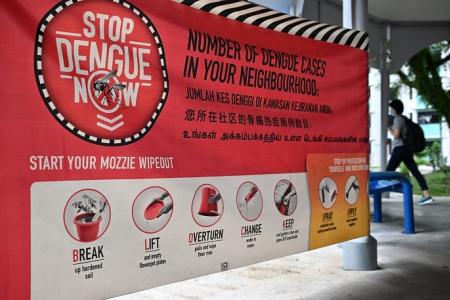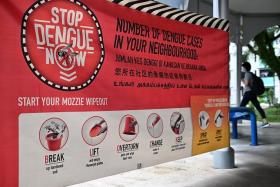15 dengue deaths so far in 2024
There have been 15 reported deaths from local dengue infections so far in 2024, more than double the six deaths in the whole of 2023, according to the National Environment Agency (NEA).
The dengue case tally so far in 2024 stands at 12,736. In comparison, the total number of cases in 2023 was 9,949, while in 2022, 32,173 cases were recorded.
In its quarterly dengue surveillance report, NEA also noted that there was a dip in dengue cases over the past quarter – with 2,963 cases from July to September, 27.6 per cent lower than the number recorded from April to June.
From July to September, NEA identified 354 dengue clusters – 309 of which were closed in the same period. The number of clusters also decreased by about 18 per cent compared with the previous quarter.
The agency found about 4,900 mosquito breeding habitats over the same period, an increase of about 1 per cent compared with the previous three months.
NEA noted that the more common breeding habitats at home include pails, flowerpot plates or trays, vases, refuse bins outside landed properties, and on plastic or canvas sheets.
Common breeding areas in public places include covered perimeter drains, covered carpark drains, discarded containers, gully traps and plants.
Meanwhile, weekly dengue figures in October show there has been a significant decrease in the number of cases, compared with over a month ago, when cases spiked to 182 in the week of Sept 15 to Sept 21.
Overall, 118 dengue cases were reported from Oct 20 to Oct 26 – 17 more than in the previous week.
As at 11am on Oct 29, eight cases were recorded, according to the NEA website.
The agency also said that 23 active dengue clusters were detected as at Oct 28.
Eight of them had a red alert, which means a cluster with 10 or more cases.
NEA noted that the cluster at Jurong West Street 74/Westwood Avenue – with 67 cases – had an especially fast rate of transmission.
Continuous transmission has also been taking place in the clusters at Jurong East Street 21/Toh Guan Road and Cashew Road, with 96 and 78 cases, respectively.
The 65-case cluster at Ang Mo Kio Central 3 has closed in the recent week, NEA said.
Currently, four dengue virus serotypes are circulating in Singapore. Dengue virus serotype 2, also known as DENV-2, has been predominant since September 2023. In 2023, DENV-1 and DENV-3 were more dominant.
The Republic experienced its largest dengue outbreak in 2020, with 35,315 cases and 32 deaths.
The spike at the time was attributed to several factors, including warmer and humid conditions, which are beneficial for mosquito breeding, as well as people being bitten by dengue-carrying mosquitoes when they worked from home.
Residents, especially those living in dengue cluster areas, can guard against dengue by spraying insecticide in dark corners around the house, applying insect repellent regularly, and wearing long-sleeved tops and trousers.
Get The New Paper on your phone with the free TNP app. Download from the Apple App Store or Google Play Store now


